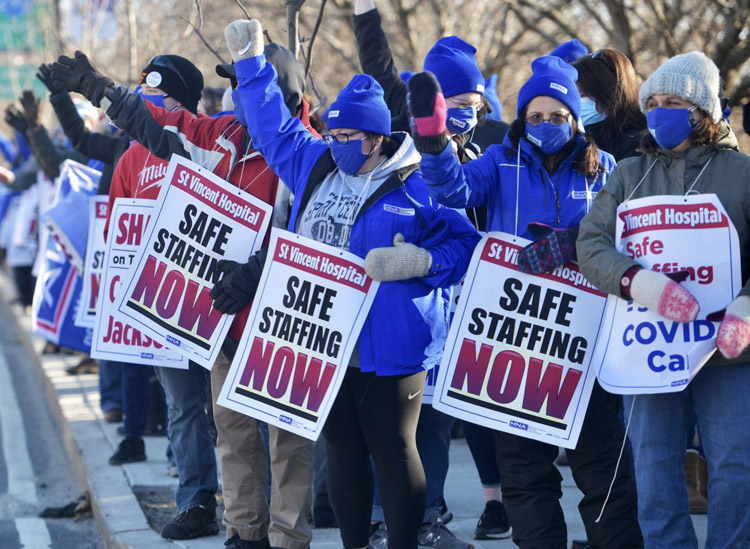WORCESTER, Mass. —Nurses organized by the Massachusetts Nurses Association at St. Vincent Hospital struck the Tenet-owned facility here for 10 months.
On Jan. 3 they voted 487-9 to ratify a contract that provides for a limit of four patient assignments per nurse in several areas of the hospital where previously they were often required to oversee five patients. The nurses held out for as long as necessary to win more control over safety and working conditions on the job.
The nurses also won limits on the bosses’ ability to send nurses home midshift, better health insurance benefits for part-time nurses, substantial wage increases, and the right for all striking nurses to return to positions they held prior to the walkout.
“This is an enormous victory for our patients and our members, and it is a testament to the grit and determination of every nurse who walked that line, day in and day out,” Marlena Pellegrino told the press. She is a 35-year registered nurse at the hospital and co-chair of the nurses local bargaining unit, which represents over 700 nurses. “We felt the weight of the entire labor movement on our shoulders. The strike was not about us, it was about all the fights.”
“We had one common issue that united the nurses — the patients were not being taken care of,” she told the Militant. “We stayed out until we could all walk in together on our own terms.”
The union thought they had finally reached a settlement in mid-August that would have improved staffing levels. But Tenet bosses announced they would refuse to allow over 100 of the most experienced nurses to return to their jobs because they intended to keep all the scabs. They said they would offer senior nurses who went on strike less desirable positions.
“It was almost like a separate war after that to stay out the last few months,” said Pellegrino. “The hospital was continuing to try to break the union.”
Because of the length of the strike battle, nurses lost unemployment income and medical benefits. Pellegrino said the union organized to work with every nurse to do whatever was necessary for them not cross the picket line. “If someone was having trouble, we reached out to help,” she said. “We had nurses who had not looked for another job in 35 years. We worked together on their resumes to get hired. Some of us live a few minutes from the hospital but took jobs an hour’s drive away.
“Many nurses didn’t know each other before the strike. Now we are more united and we know each other’s families. We grew in character and fortitude,” she said. “The corporation waged psychological warfare against us. It tested our humanity. It wasn’t about the contract but our own decency and moral core. Would you sell out? The majority said ‘No!’
“No matter what we needed we could always go to the picket line. We fed off one another to find fight and energy. It’s a beautiful thing.” The union maintained the picket line 18 hours a day for the duration of the strike and kept open a strike headquarters that welcomed solidarity and donations. Delegations from a wide variety of unions and groups of workers visited the picket line and came to rallies called by the union.
“We never felt alone. The community and so many understood,” said Dominique Muldoon, another RN and strike leader at the hospital. “We used to wait for the train that travels under the hospital at 9 or 10 p.m. because the crew always blew the horn to let us know they were on our side. This strike shows that when you are resolved you can win.”
Fight to implement the contract
“The fight isn’t over,” said Bill Lahey, a nurse for 40 years at St. Vincent and member of the bargaining committee, noting the nurses now face having to fight to implement the contract as they return to work. Hospital CEO Carolyn Jackson says all nurses that choose to do so need to return to work by Jan. 22. She claimed only about 400 of 600 still on strike would return, because many now have other jobs. Union leaders said about 140 nurses had crossed the picket line by the end of the strike.
“They are trying to get replacement nurses to hate us,” Teresa Brouillet, a nurse for 12 years at the hospital, told the Militant. “One of them is anti-union and circulated a petition to decertify the Massachusetts Nurses Association as the union representing the nursing staff at the hospital.”
“Many of the replacements are new graduates,” said Brouillet. “All the replacements will stay, but have to move to new positions. We haven’t bullied anybody. We are going to talk to them one on one and explain the staffing ratios we won. They should compare the six patients you get where I work now to the four we have under the new contract.”


